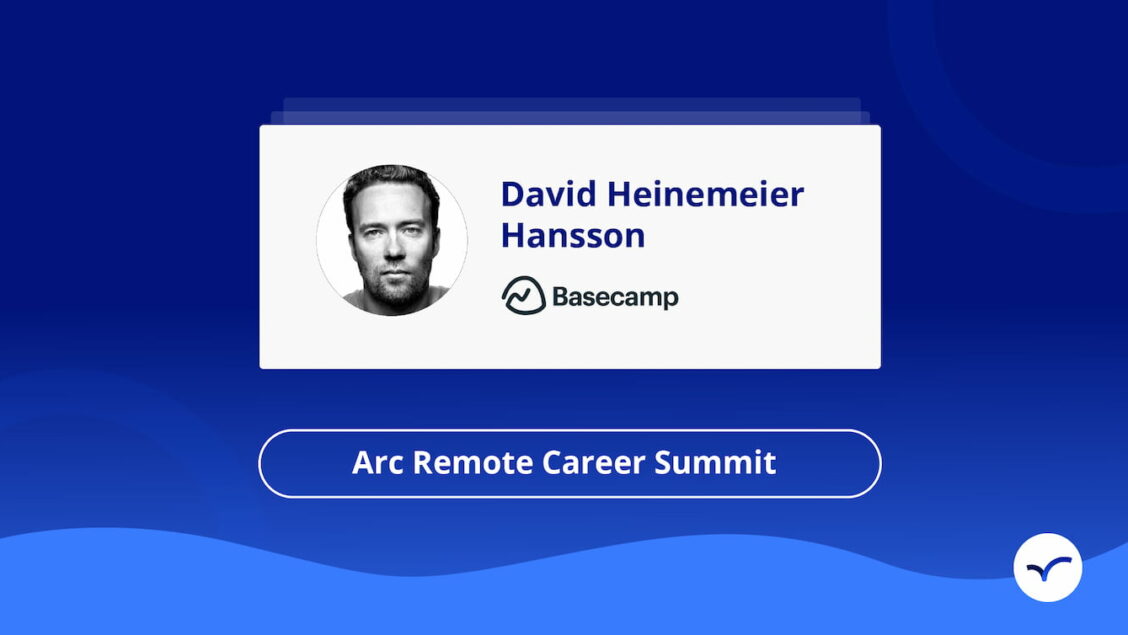If there’s one thing that’s common to early adopters of a fully-distributed company model, it’s throwing orthodox management styles out the window.
One of remote work management’s more prominent voices is Basecamp and HEY’s David Heinemeier Hansson (DHH). Aside from his work as Co-Founder and CTO of these products, DHH is also a co-author of management books on running both “remote” and “calm” companies.
Given his 20+ years’ experience at working and leading remotely, we were curious about DHH’s take on recent events. So at the Arc Remote Career Summit 2020, we invited him to share his thoughts. To lead the conversation, we asked Workplaceless’ Tammy Bjelland to host, and their chat included topics such as:
- The current acceleration of remote work
- Writing for impact
- Building a calm and ethical company
…and more. Check out the conversation by watching the video below, or read on for a quick summary of his key points.
Looking for top talent fast? See how Arc can help you:
⚡️ Find developers, designers, marketers, and more
⚡️ Freelance or full-time remote + fully vetted
⚡️ Save up to 80% with global hires
Hire top talent with Arc risk-free →
COVID-19 Has Accelerated the Adoption of Remote Work
It’s not what I imagined when we talked about the tipping point that was bound to happen. I thought that was going to happen sort of organically. Now it’s being forced upon us.
The COVID-19 pandemic has changed the way we live and work. Although this has made daily life harder for everyone, the one potential small silver lining is that it has forced the acceleration of remote work globally.
When it comes to the adoption of remote work by some of the biggest names in the tech world, DHH’s initial reaction was “finally!” There’s a lot of inertia to rolling out change in big companies, but this is also a unique chance for these companies to experiment with new ways of working. Indeed, according to DHH, this sudden adoption of remote work has caused a many of people to realize that their previous misconceptions of remote work are actually false.
It’s been this amazing confrontation between myth and reality. […] A bunch of people [had] preconceived notions of what remote work was, or how it was going to work. And then reality — the pandemic — just came in like a wrecking ball and smashed that up. And here we are with a bunch of people, all of a sudden having a completely new outlook on what’s possible and what they feel about remote work.
However, DHH also acknowledged that not all these forced-to-go-remote tech company employees will have a positive experience. In the workforce, there are people who enjoy being co-located in an office, and may decide that in the future, remote work isn’t a good fit for them.
However, there is also a large group of “programmers and designers and writers and strategists and other people who really benefit from long stretches of uninterrupted time” — for this group, remote work may be a game-changer, and something they want to do long-term.
What Tech Giants Should Expect as They “Go Remote”
It’s Not Office As Usual
If we had to summarize it in one word, that word would be change. DHH’s first piece of advice for newly-remote companies is to not try to replicate the office. In fact, if you go down this route, it’s going to be a bad experience for everyone.
One of these bad experiences that more and more people have discovered is replacing constant meetings with constant video calls is leading to videocall fatigue. Although video calls have their place, according to DHH they’re fundamentally different from an in-person meeting.
Asynchronous Communication, Please
Instead, newly-remote companies should focus on shifting from a synchronous to an asynchronous style of communication. (DHH thinks use of instantaneous chat tools should be limited to “when things are on fire”.) Instead of spending time in never-ending meetings, ideas should be changed into written form:
And you crystallized something that might’ve been a meandering one hour meeting into something that can be read in five minutes. And then sometimes the conclusion to those five minutes is: “Great. Let’s do it.” No further action required. You’ve just saved an hour or everyone’s time by doing that.
Another benefit of this approach, according to DHH, is that writing doesn’t happen comment-by-comment, in the same way that a meeting or chatroom works. Instead, in an asynchronous/written communications model, people don’t lose their opportunity to have a say because they weren’t there at the time. Instead, they can consider a document, then respond.
You get better thinking, better positions, better collaboration.
As part of this, you need to be able to write well — more on this later!
Fewer Interruptions = More Deep Work
Another key recommendation from DHH is to create stretches of uninterrupted time, and creating time for deep work. Not only does this drive deep work and productivity, but it allows team members to make serious progress on the tasks that give them satisfaction.
Flexibility and Understanding
Finally, DHH noted that this pandemic isn’t just about working remotely. Instead, it’s also about everything else that has suddenly landed on everyone’s plates. Are you suddenly not only facing remote work, but also having kids around and having to figure out home-schooling? That’s a lot for anyone to take on!
Companies should understand that right now, team members may not be able to make, e.g. a meeting, at a certain time. The take away: newly-remote companies should allow flexibility to work together without necessarily being together at the same time.
Writing Unlocks the Power of Remote Work
According to DHH, when you’re forced to write things down, you’re forced to think them through. This helps your ideas become more clear, and easier to communicate.
Aside from clearer idea-sharing, major side-benefits of having a writing-first approach to company communications are that it:
- Allows idea amplification within bigger companies (it’s easier to spread a document than get everyone in a meeting!)
- Creates a record of company history that anyone (including new hires) can search — when and why decisions were made
How Do You Become a Better Writer?
According to DHH, there’s a simple trick to becoming a better writer: read and write. All the time.
Writing is never going to go out of style. So these are investments you’re going to make, that’s gonna pay off for decades[, …] if not the rest of your life.
In practice, this means reading wide resources from a broad section of humanity: from literature to historical documents (as DHH mentioned, writing is how humanity transports ideas through time!).
The best writing has stood the test of time. So when you can find a book that’s been around for 3000 — or not quite 3000 years, two and a half thousand years or something like that — […] it’s probably pretty good.
Some particular books he recommends include:
- On Writing Well (William Zinsser)
- The Elements of Style (William Strunk Jr)
- The Manual (Epictetus)
The other part, of course, is that you have to write. Look for, and create opportunities to do this, whether it’s helping others on Stack Overflow, or working on your writing skills by simply writing for yourself while job-searching (good writing never goes out of style!).
If you write on Stack Overflow, if you write technical stuff, or, if you’re not in a technical role, you write about things that you learn, even if there’s no one else listening.
Stand Out as a Job Candidate by Writing Well
We’ve established how to become a better writer, but making sure that you’re actually doing this is critical for job-seekers. Why? Giving an example from his own company, Basecamp, DHH mentioned:
You submit your CV and your cover letter, and we don’t even look at your CV until we’ve been captured by your cover letter.
This means: make a strong first impression!
As part of this, finding the right tone is crucial when trying to capture the attention of hiring managers. DHH advises job-seekers to study the tone of the organization they’re trying to join.
You can also try Arc, your shortcut to the world’s best remote talent:
⚡️ Access 450,000 top developers, designers, and marketers
⚡️ Vetted and ready to interview
⚡️ Freelance or full-time
Try Arc and hire top talent now →
Can Individual Contributors Help Create Calm Companies?
Company changes are most impactful when they come from the top. Sure. But can individual contributors do anything to try to change their company’s culture from frantic to calm? DHH says yes: in large companies, many teams have their own culture, so they have more leeway in setting their own approach. After all, it’s easier to influence your own team than a whole company!
Also, consider your own behaviors. Are you modeling the example of how you want the team to work?
You can help set the example you want to be. Don’t call the meetings that could have been a write up.
And then change will naturally start:
Others might go like, do you know what? This was really nice. I kind of had a chance to just read the idea, understand it, respond to it on my own time.
DHH admits that organizations have inertia. So once you’ve focused on yourself, recruit a partner to the new style of working (and start slowly: don’t just go from all-day meetings to none).
You demonstrate to them the value, you show the results, and people are going to take notice. I guarantee it.
You Can Train Junior Employees Remotely!
A member of the audience asked DHH for his opinion on whether remote work makes it more likely that companies will not hire juniors?
Regarding the idea that you shouldn’t hire juniors, because it’s too hard to train them remotely, DHH had a strong response:
I’m sorry. No, you’re wrong. You totally can. And we’ve been doing it for 20 years and in fact, in many ways, it’s easier.
How can training be easier remotely? According to DHH, if the company has a written culture, new hires can become self-sufficient faster (as they can look things up themselves). That said, onboarding at any company, remote or not, still requires work. There’s never a time that you can just drop someone into an organization and expect them to know everything on day one!
This happens when someone new gets brought on. We’ll send them a link to a write up from 2016 when something that’s relevant to the current project that they’re on has been discussed. And they’re like, it’s like a time machine. You could go back to these meetings. You can go back to these moments and times when the decisions were being made, and you can really understand the organization at a much deeper level.
DHH also noted that certain roles may have different onboarding requirements. Basecamp, historically, has done in-person onboarding for their Customer Service hires.
The whole company also still meets in person sometimes:
Those human connections really do matter. They don’t necessarily matter that much for productivity or for learning the skills, but we have to learn each other.
Human connections still count!
How Basecamp and HEY Handled the Pandemic
“Pandemic remote” and “normal remote” are not the same thing. Even for a company which was used to working remotely, the last few months have not been business-as-usual at Basecamp.
This pandemic is hard on everyone. It’s harder on some, or it’s more hard for some than it is for others, but it’s hard on everyone.
For starters, HEY was initially intended to launch in April. But given the global situation, and the stress and uncertainties everyone was facing, the team decided to postpone. Interestingly, they didn’t set a new launch date at the time. First, they focused on regrouping as a team: was everyone safe?
The entire team took a Friday and Monday off in late March to get some critical tasks off their respective plates to adapt to the new situation. Only then did they return to working towards the launch of HEY.
Wrapping Up
Thank you to David Heinemeier Hansson for making time in his busy schedule (so soon after the launch of HEY!) to attend the Arc Remote Career Summit 2020. And also a giant thank you to Tammy Bjelland for hosting this session. We learned a lot — and hopefully you did too!
Questions? Thoughts? Let us know in the comments.
You can also try Arc, your shortcut to the world’s best remote talent:
⚡️ Access 450,000 top developers, designers, and marketers
⚡️ Vetted and ready to interview
⚡️ Freelance or full-time








